The Incarnation
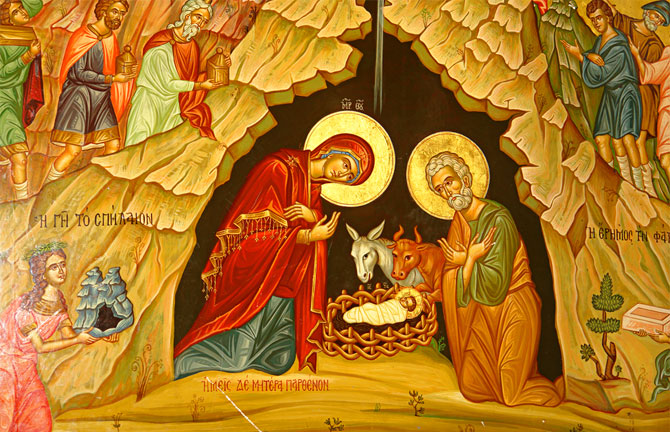 When we think that in a city like London there are so many little places where people gather for the feast and yet there are so many people who are in the street, in homes, in hostels, it is very painful. Probably none of you has experience of being in the street; I had it when I was a child and a youth, and it’s a very unpleasant feeling to know that you have nowhere to go and that you are totally unwanted in any of the places that shine with light, which obviously speak of warmth to you.
When we think that in a city like London there are so many little places where people gather for the feast and yet there are so many people who are in the street, in homes, in hostels, it is very painful. Probably none of you has experience of being in the street; I had it when I was a child and a youth, and it’s a very unpleasant feeling to know that you have nowhere to go and that you are totally unwanted in any of the places that shine with light, which obviously speak of warmth to you.
The Nativity sermon of St. John Chrysostom
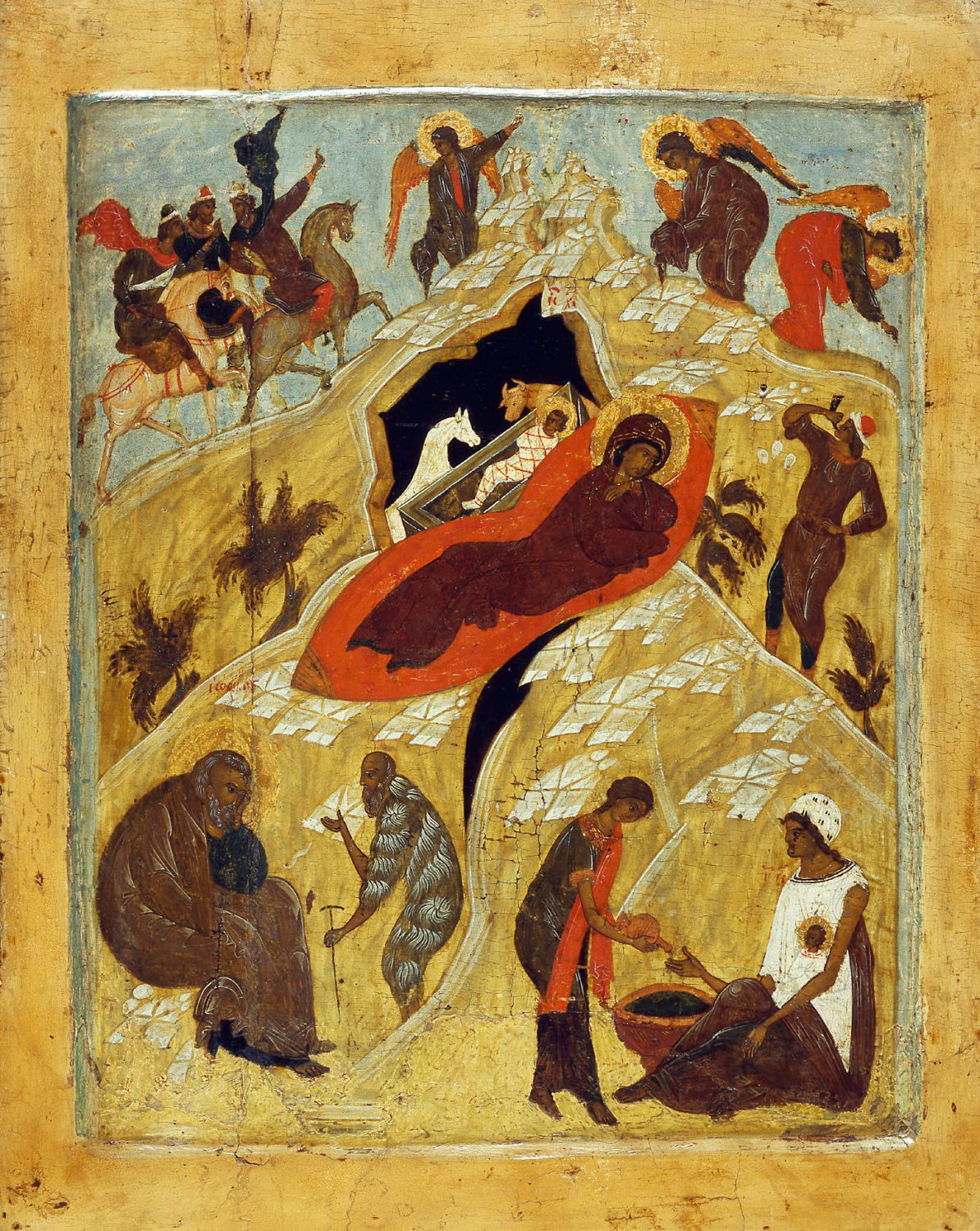 BEHOLD a new and wondrous mystery.
BEHOLD a new and wondrous mystery.
My ears resound to the Shepherd’s song, piping no soft melody, but chanting full forth a heavenly hymn. The Angels sing. The Archangels blend their voice in harmony. The Cherubim hymn their joyful praise. The Seraphim exalt His glory. All join to praise this holy feast, beholding the Godhead here on earth, and man in heaven. He Who is above, now for our redemption dwells here below; and he that was lowly is by divine mercy raised.
Bethlehem this day resembles heaven; hearing from the stars the singing of angelic voices; and in place of the sun, enfolds within itself on every side, the Sun of justice. And ask not how: for where God wills, the order of nature yields. For He willed; He had the power; He descended; He redeemed; all things yielded in obedience to God. This day He Who is, is Born; and He Who is, becomes what He was not. For when He was God, He became man; yet not departing from the Godhead that is His. Nor yet by any loss of divinity became He man, nor through increase became He God from man; but being the Word He became flesh, His nature, because of impassability, remaining unchanged.
Bodily Fasting for the soul's benefit
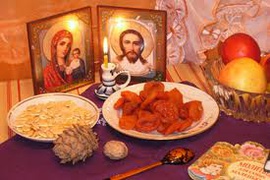 The Nativity fast begins on November 14/27, and lasts forty days. The Nativity fast is not as strict as Great Lent or the Dormition fast, and can be compared to the Apostle’s fast. It was instituted by the Church so that we would worthily greet the feast of the Nativity of Christ after having cleansed our hearts by prayer and repentance.
The Nativity fast begins on November 14/27, and lasts forty days. The Nativity fast is not as strict as Great Lent or the Dormition fast, and can be compared to the Apostle’s fast. It was instituted by the Church so that we would worthily greet the feast of the Nativity of Christ after having cleansed our hearts by prayer and repentance.
Homily of the Feast of the Kazan Icon of the Mother of God
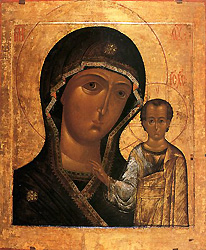 Commemorated July 8/21, October 22/November 4
Commemorated July 8/21, October 22/November 4
In the name of the Father, Son, and Holy Spirit!
Beloved brothers and sisters, today we celebrate and remember with solemn prayer and praise the manifestation of the Mother of God’s mercy for the Orthodox Russian nation through her miraculous deliverance of our Fatherland in 1612 from foreign invasion.
Our ancestors, the Russian people, loved the Mother of God, had special and deep faith in her heavenly protection of the Christian race, and they always turned to her with fervent prayer in their sorrows and calamities. Although entire countries considered the Most Holy Virgin to be their Protectress and honored her, in our homeland the name of the Mother of God was always surrounded with particular veneration, immeasurably greater than in any other place, and the Mother of God has never poured such grace and mercy out upon a country as she has upon the Russian land. In almost every Russian city there is unfailingly a source of the Mother of God’s grace—her miracle-working icons, which she desired to give to people as a heavenly assurance of her love, and as a consolation to suffering humankind. Our people loved to call the Mother of God by special names that describe her heavenly protection and mercy, and the Mother of God did not put their faith to shame, but granted speedy help to everyone who asked for it, and to our Fatherland as a whole.
Venerable Athanasius the Founder of the Great Lavra and Coenobitic Monasticism on Mt. Athos
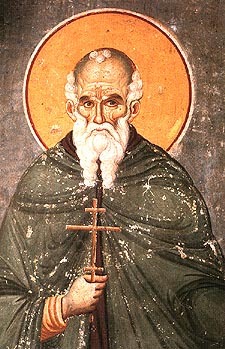 Saint Athanasius of Athos, in holy Baptism named Abraham, was born in the city of Trebezond. He was orphaned at an early age, and being raised by a certain good and pious nun, he imitated his adoptive mother in the habits of monastic life, in fasting and in prayer. Doing his lessons came easily and he soon outpaced his peers in study.
Saint Athanasius of Athos, in holy Baptism named Abraham, was born in the city of Trebezond. He was orphaned at an early age, and being raised by a certain good and pious nun, he imitated his adoptive mother in the habits of monastic life, in fasting and in prayer. Doing his lessons came easily and he soon outpaced his peers in study.
After the death of his adoptive mother, Abraham was taken to Constantinople, to the court of the Byzantine emperor Romanus the Elder, and was enrolled as a student under the renowned rhetorician Athanasius. In a short while the student attained the mastery of skill of his teacher and he himself became an instructor of youths. Reckoning as the true life that of fasting and vigilance, Abraham led a strict and abstinent life, he slept little and then only sitting upon a stool, and barley bread and water were his nourishment. When his teacher Athanasius through human weakness became jealous of his student, blessed Abraham gave up his teaching position and went away.

